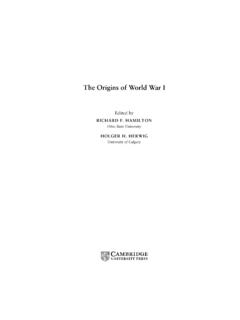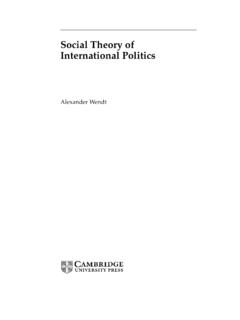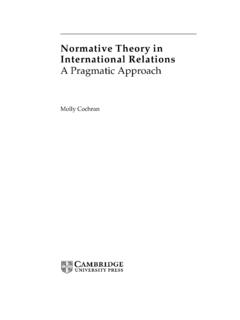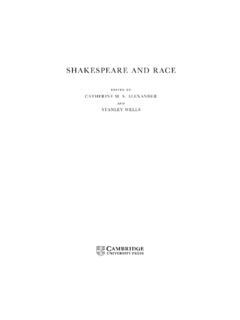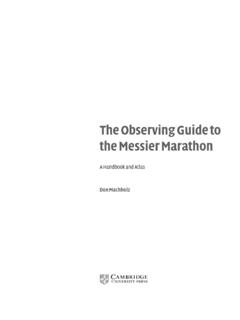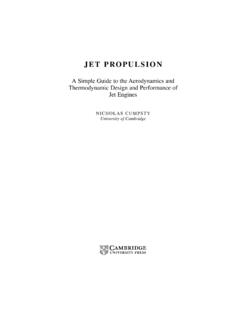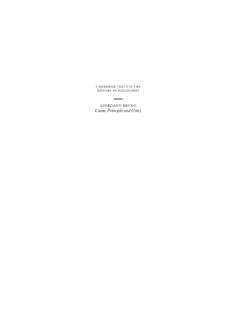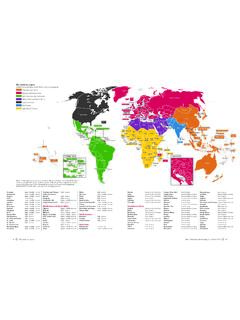Transcription of English as a global language - Library of Congress
1 English as a global languageSecond editionDAVID CRYSTALPUBLISHED BY THE PRESS SYNDICATE OF THE UNIVERSITY OF CAMBRIDGEThe Pitt Building, Trumpington Street, Cambridge CB2 1RP, United KingdomCAMBRIDGE UNIVERSITY PRESSThe Edinburgh Building, Cambridge, CB2 2RU, UK40 West 20th Street, New York, NY 10011-4211, USA477 Williamstown Road, Port Melbourne, VIC 3207, AustraliaRuiz de Alarc on 13, 28014 Madrid, SpainDock House, The Waterfront, Cape Town 8001, South David Crystal 1997, 2003 This book is in copyright. Subject to statutory exceptionand to the provisions of relevant collective licensing agreements,no reproduction of any part may take place withoutthe written permission of Cambridge University published 1997 Second edition 2003 Printed in the United Kingdom at the University Press, CambridgeTypefacesGalliard pt and FormataSystemLATEX2 [TB]A catalogue record for this book is available from the british LibraryISBN 0 521 82347 1 hardbackISBN 0 521 53032 6 paperbackContentsList of tablespageviiPreface to the second editionixPreface to the first editionxii1 Why a global language ?
2 1 What is a global language ?3 What makes a global language ?7 Why do we need a global language ?11 What are the dangers of a global language ?14 Could anything stop a global language ?25A critical era272 Why English ? The historical context29 Origins30 America31 Canada36 The Caribbean39 Australia and New Zealand40 South Africa43 South Asia46 Former colonial Africa49 South-east Asia and the South Pacific54A world view59vContents3 Why English ? The cultural foundation72 Political developments78 Access to knowledge80 Taken for granted834 Why English ? The cultural legacy86 International relations86 The media90 The press91 Advertising93 Broadcasting95 Cinema98 Popular music100 International travel104 International safety106 Education110 Communications114 The right place at the right time120 5 The future of global English123 The rejection of English124 Contrasting attitudes: the US situation127 New Englishes140 The linguistic character of new Englishes147 Grammar147 Vocabulary158 Code-switching164 Other domains168 The future of English as a world language172An English family of languages?
3 177A unique event?189 References192 Index202viList of tables1 Speakers of English in territories where thelanguage has had special relevancepage622 Annual growth rate in population in selectedcountries, 1996 2001713(a) Some differences in british and Americanadverbial usage150(b) Specific adverb+adjective pairs showingdifferences in conversational usage1504 Some potentially distinctive grammaticalfeatures of New Englishes153 5 Some distinctive collocations and idiomsnoted in Pakistan, Nigeria and Ghana163vii1 Whyagloballanguage? English is the global language . A headline of this kind must have appeared in a thousand news-papers and magazines in recent years. English Rules is an actualexample ,presenting to the world an uncomplicated scenario sug-gesting the universality of the language s spread and the likelihoodof its statement prominently displayed in thebody of the associated article ,memorable chiefly for its alliterativeingenuity ,reinforces the initial impression: The british Empiremay be in full retreat with the handover of hong kong .
4 But fromBengal to Belize and Las Vegas to Lahore ,the language of thesceptred isle is rapidly becoming the first global lingua franca. Millennial retrospectives and prognostications continued in thesame vein ,with several major newspapers and magazines findingin the subject of the English language an apt symbol for the themesof globalization ,diversification ,progress and identity addressed intheir special programmes and series ,too ,ad-dressed the issue ,and achieved world-wide ,by the turn of the century ,the topic must have made contact1 Globe and Mail ,Toronto ,12 July (1999).3 For example,Back to Babel ,a four-part (four-hour) series made in 2001 byInfonation ,the film-making centre within the british Foreign and Com-monwealth Office ,had sold to sixty-four countries by 2002. The series wasnotable for its range of interviews eliciting the attitudes towards English ofusers in several countries.
5 It was also the first series to devote a significant1 English AS A global language with millions of popular intuitions at a level which had simply notexisted a decade are the kinds of statement which seem so obvious thatmost people would give them hardly a second thought. Of courseEnglish is a global language ,they would say. You hear it ontelevision spoken by politicians from all over the world. Whereveryou travel ,you see English signs and advertisements. Wheneveryou enter a hotel or restaurant in a foreign city ,they will under-stand English ,and there will be an English menu. Indeed ,if thereis anything to wonder about at all ,they might add ,it is why suchheadlines should still be Englishisnews. The language continues to make news dailyin many countries. And the headlineisn tstating the obvious. Forwhat does it mean ,exactly? Is it saying that everyone in the worldspeaks English ? This is certainly not true ,as we shall see.
6 Is itsaying ,then ,that every country in the world recognizes Englishas an official language ? This is not true either. So what does itmean to say that a language is a global language ? Why is Englishthe language which is usually cited in this connection? How didthe situation arise? And could it change? Or is it the case that ,once a language becomes a global language ,it is there for ever?These are fascinating questions to explore ,whether your firstlanguage is English or not. If English is your mother tongue ,you may have mixed feelings about the way English is spreadingaround the world. You may feel pride ,that your language is theone which has been so successful; but your pride may be tingedwith concern ,when you realize that people in other countries maynot want to use the language in the same way that you do ,andare changing it to suit themselves. We are all sensitive to the wayother people use (it is often said ,abuse) our language .
7 Deeplyheld feelings of ownership begin to be questioned. Indeed ,if thereis one predictable consequence of a language becoming a globallanguage ,it is that nobody owns it any more. Or rather ,everyonewho has learned it now owns it has a share in it might be morepart of a programme to the consequences for endangered languages (seebelow ,p. 20). The series became available ,with extra footage ,on DVD in2002: a global language ?accurate and has the right to use it in the way they want. Thisfact alone makes many people feel uncomfortable ,even vaguelyresentful. Look what the Americans have done to English is a notuncommon comment found in the letter-columns of the Britishpress. But similar comments can be heard in the USA when peopleencounter the sometimes striking variations in English which areemerging all over the if English is not your mother tongue ,you may still havemixed feelings about it. You may be strongly motivated to learn it ,because you know it will put you in touch with more people thanany other language ; but at the same time you know it will take agreat deal of effort to master it ,and you may begrudge that made progress ,you will feel pride in your achievement ,and savour the communicative power you have at your disposal ,but may none the less feel that mother-tongue speakers of Englishhave an unfair advantage over you.
8 And if you live in a countrywhere the survival of your own language is threatened by thesuccess of English ,you may feel envious ,resentful ,or angry. Youmay strongly object to the naivety of the populist account ,withits simplistic and often suggestively triumphalist feelings are natural ,and would arise whichever languageemerged as a global language . They are feelings which give riseto fears ,whether real or imaginary ,and fears lead to marches , language hunger-strikes , language rioting andlanguage deaths are a fact ,in several countries. Political differencesover language economics ,education ,laws and rights are a dailyencounter for millions. language is always in the news ,and thenearer a language moves to becoming a global language ,the morenewsworthy it is. So how does a language come to achieve globalstatus?What is a global language ?A language achieves a genuinely global status when it developsa special role that is recognized in every country.
9 This mightseem like stating the obvious ,but it is not ,for the notion of special role has many facets. Such a role will be most evident incountries where large numbers of the people speak the language3 English AS A global LANGUAGEas a mother tongue in the case of English ,this would mean theUSA ,Canada ,Britain ,Ireland ,Australia ,New Zealand ,SouthAfrica ,several Caribbean countries and a sprinkling of other terri-tories. However ,no language has ever been spoken by a mother-tongue majority in more than a few countries (Spanish leads ,inthis respect ,in some twenty countries ,chiefly in Latin America) ,somother-tongue use by itself cannot give a language global achieve such a status ,a language has to be taken up by othercountries around the world. They must decide to give it a specialplace within their communities ,even though they may have few(or no) mother-tongue are two main ways in which this can be done.
10 Firstly ,alanguage can be made the official language of a country ,to be usedas a medium of communication in such domains as government ,the law courts ,the media ,and the educational system. To get onin these societies ,it is essential to master the official language asearly in life as possible. Such a languageis often described as a second language ,because it is seen as a complement to a per-son s mother tongue ,or first language .4 The role of an officiallanguage is today best illustrated by English ,which now has somekind of special status in over seventy countries ,such as Ghana ,Nigeria ,India ,Singapore and Vanuatu. (A complete list is given atthe end of chapter 2.) This is far more than the status achieved byany other language though French ,German ,Spanish ,Russian ,and Arabic are among those which have also developed a consid-erable official use. New political decisions on the matter continueto be made: for example ,Rwanda gave English official statusin ,a language can be made a priority in a country sforeign- language teaching ,even though this language has no offi-cial status.
